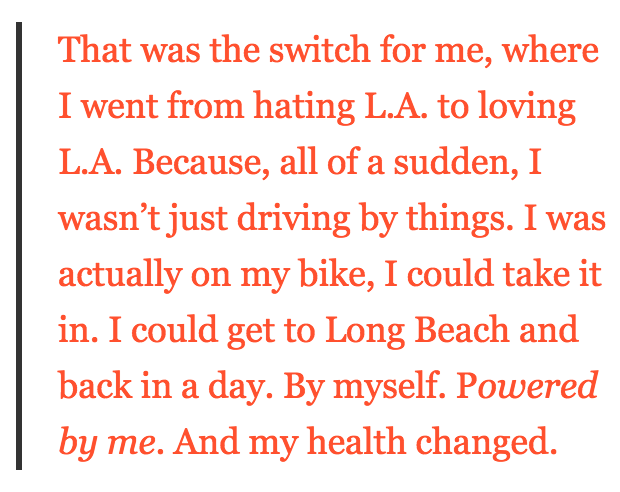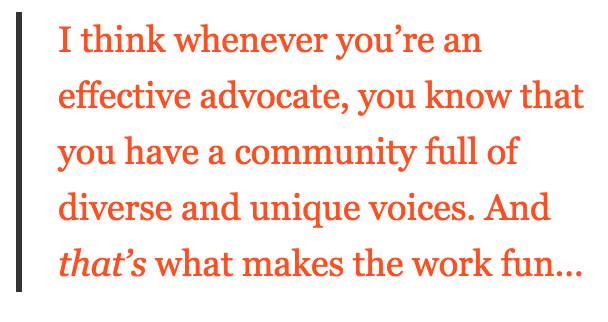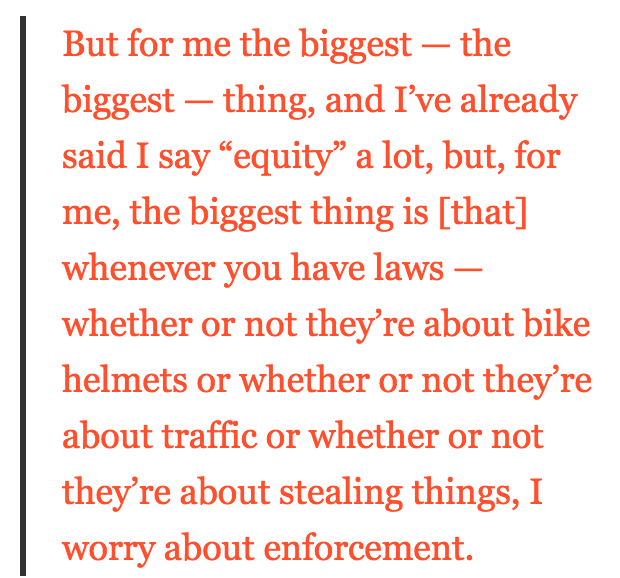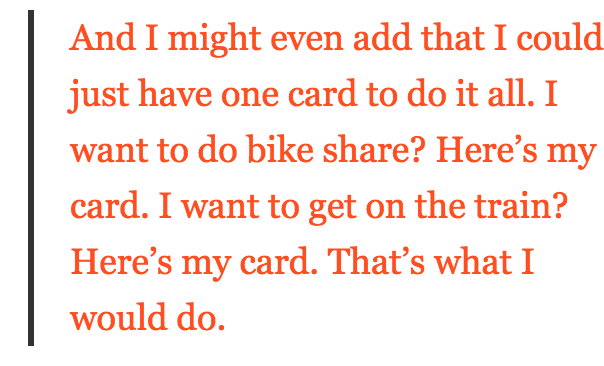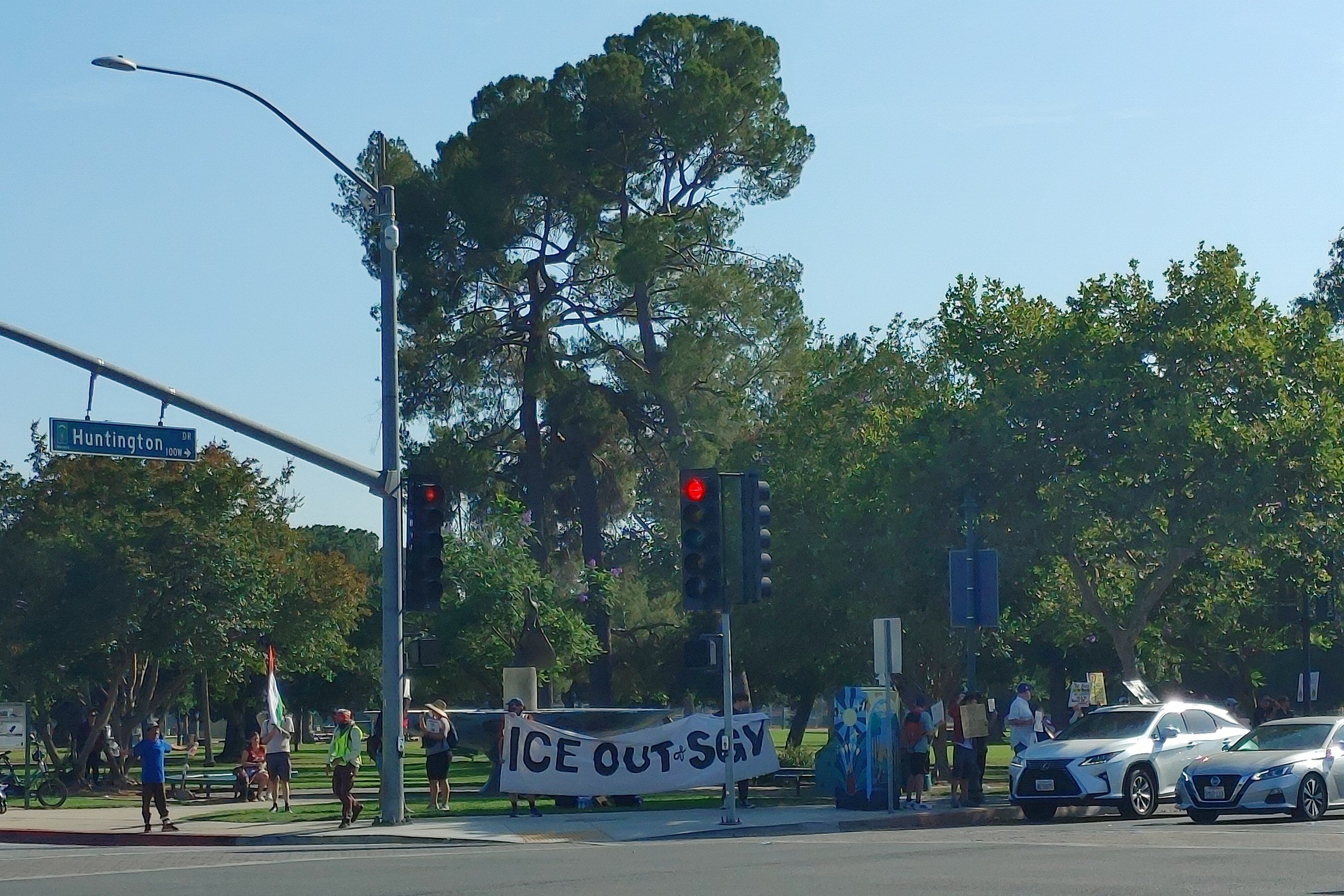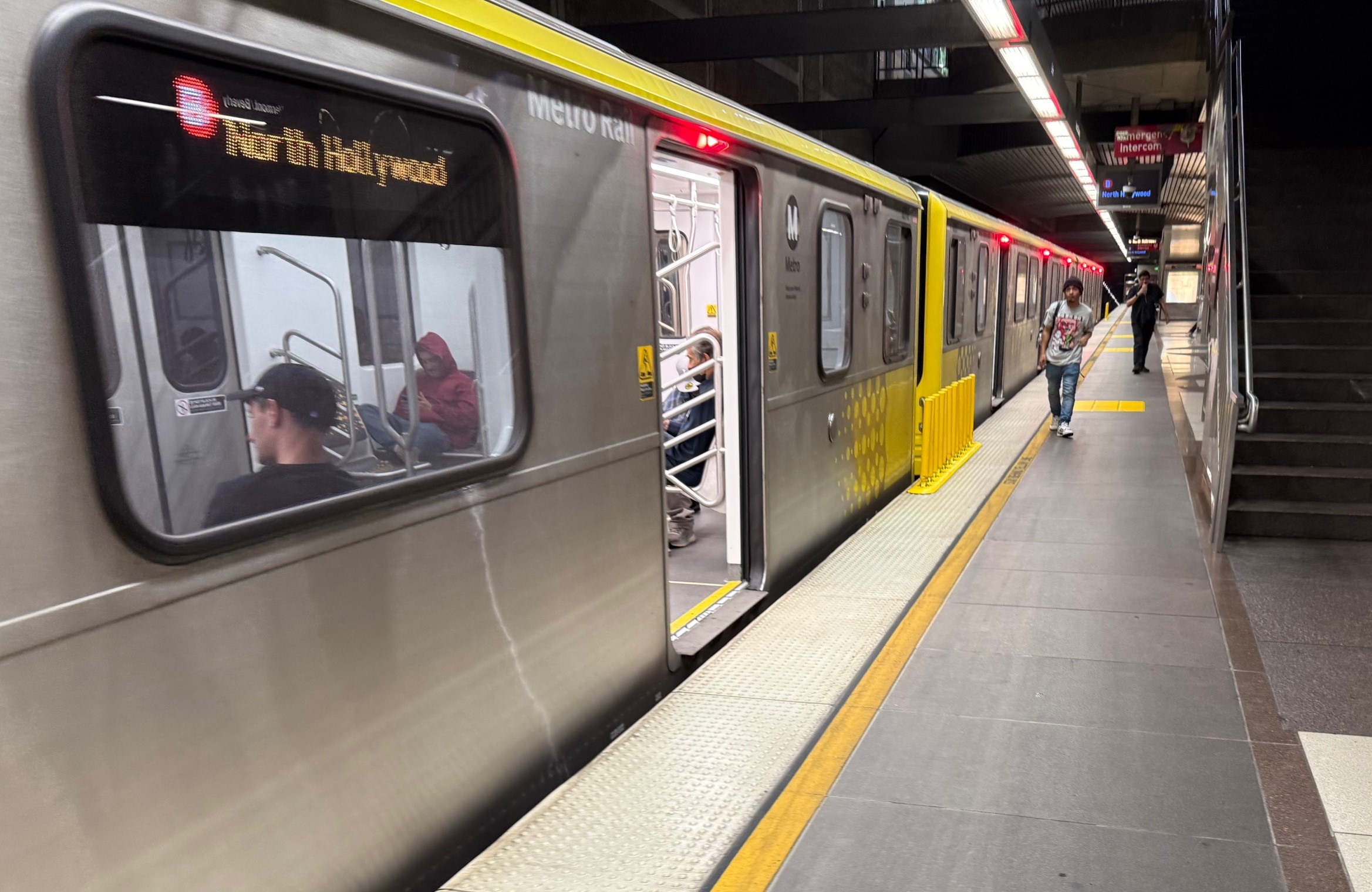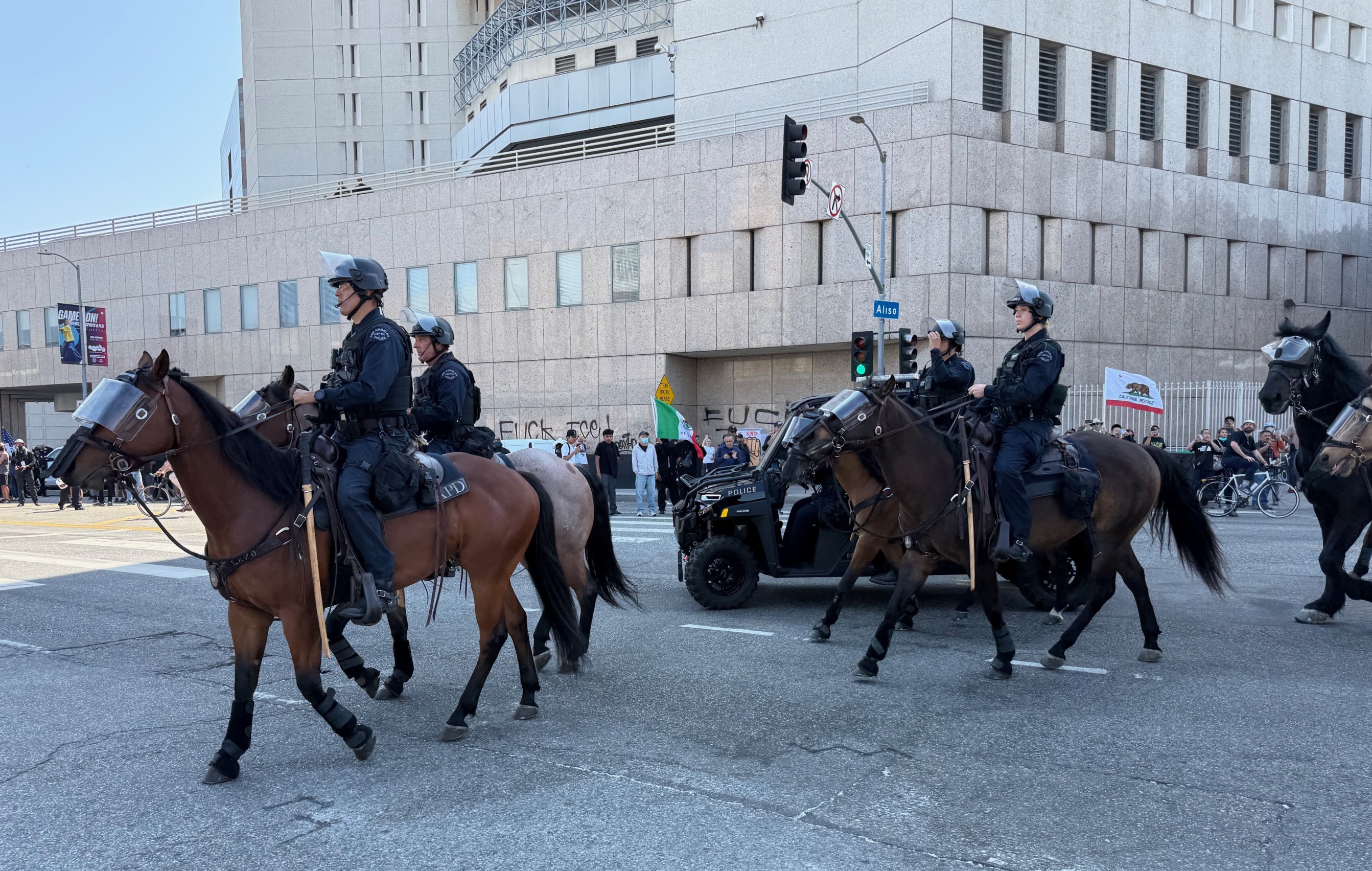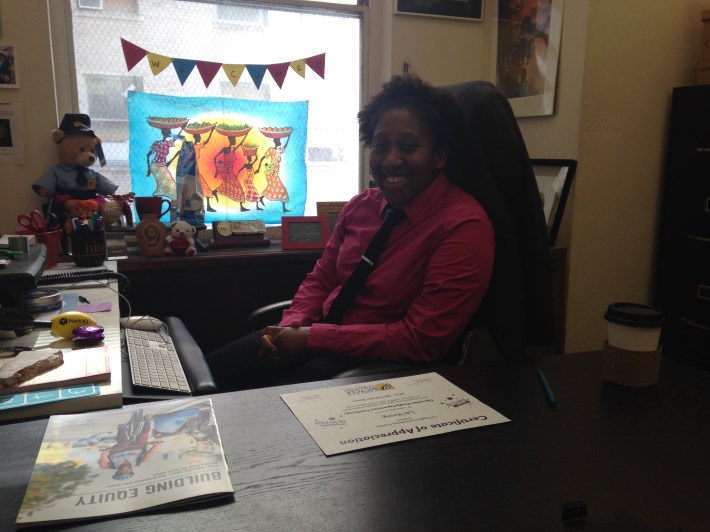
When the Los Angeles County Bicycle Coalition announced its new Executive Director last December, the early reviews were somewhat mixed. Those close to the hiring process were confident they had the right mix, and many backers of the organization took to social media to embrace the new face of bike advocacy in Los Angeles, Tamika Butler.
But others weren't so sure. Butler was a relative unknown in the bicycling world, despite a track record of accomplishment at the Liberty Hill Foundation and the Young Invincibles. She even came with a law degree and bar certification. But for those expecting a familiar face, the arrival of someone new to the advocacy scene in the region's top position was a surprise.
A couple of months later, however, it already feels to a lot of people that she's always been a part of the local scene.
That said, Butler brings something new to the table. She places the struggle for safe and fun bicycling options into the larger struggle for equity for all communities, especially financially disadvantaged communities of color.
"Even though we're people on bikes, we still live in this world with these other factors, and we still have to bring them into the conversation."
At the end of our interview, we talk about how a small news item in Santa Monica might be a game-changer for the whole region. I'm going to make you listen (or scroll) to the end to get there. But in another way, LACBC has already changed the game by bringing in a powerful voice for inclusion and equity to the fore in conversations about bicycling and transportation.
And that's a good thing.
After the jump is a lightly edited transcript of our conversation from a couple of weeks ago. Below is the audio.
Damien: For someone who's worked with Young Invincibles... and then with Liberty Hill, it doesn't seem like a smooth career path from there to LACBC Executive Director? ...What attracted you to this position?
Tamika: Part of it is thinking about my own story...I'm a Midwest kid...my dad was in the military, so I grew up all over, but I went to high school and college in Nebraska. In this place where having a car meant freedom in this way that, I think, for a lot of people who bike, biking means freedom.
In the Midwest, cars really mean freedom because there is so much space and everything is so spread out...
When I moved to L.A., and everyone was like, "You're going to be in your car all the time."
I responded, "No, that's fine. I'm a driver. I'm from the Midwest, like, I love being in my car."
But I wasn't quite ready...for L.A. traffic.
It was tough. I went to law school in the Bay, and I practiced law for three years, and law really wasn't for me... When I was trying to figure out what I could do with my law degree that wouldn't be wasting it, I thought, "policy work." That's how I ended up at Young Invincibles doing policy work that was around economic justice for young adults. Because I was an employment lawyer at a legal aide office, I felt like economic justice for young adults was great and cool, but when I moved to do the Young Invincibles job, I was the only one in California. It was a national organization, and it was my job to grow our California office....So I was constantly in my car. Because I didn't know L.A., I would schedule a meeting in Long Beach and then schedule my next meeting in Santa Monica.
I found myself constantly driving, constantly on the go. I found myself constantly stopping and eating fast food to keep my day going.
I went to see a doctor, and he said, "You're young. You're African-American. You fit in this very specific range where you're pre-diabetic, and you have to do something about that."
I thought, "Great. I hate L.A., and now I'm unhealthy."
When I was in the Bay, I walked everywhere and played on three soccer teams. I was in a different place.
I had a friend who said, "Why don't we get you a bike and you can ride with me? I did the AIDS LifeCycle a few years ago. I want to do it again and I don't have anyone to train with. I'll teach you how to ride a road bike and teach you how to clip in.'"
...That was the switch for me, where I went from hating L.A. to loving L.A.
Because, all of a sudden, I wasn't just driving by things. I was actually on my bike, I could take it in. I could get to Long Beach and back in a day. By myself. Powered by me. And my health changed.
That's really what brought me to love riding bikes.
When this job came open, you know, how often do you get a chance to do work around something that you really enjoy as a hobby and really make it to your day-to-day? I see the connections between economic justice, between all the work I did in previous spaces -- I really see that connection here. And I've done policy work before; I've built an organization before, and so it fit.
Damien: LACBC has done a better job than a lot of groups including equity in its programming. Is there anything, outside of Operation Firefly which most Streetsblog readers are very familiar with, that is ongoing or coming up that we can look forward to?
Tamika: As an organization... we're really moving to make equity a core value. I think it's already been there in our work, but we haven't necessarily articulated it the best.
I'm a queer woman of color. Everything I see in the world and the lens with which I do my work and live my life is through this social justice narrative. For me, equity is huge and that's a core premise of our work.
And it's work we're already doing. We do work in the Southeast cities, which a lot of folks don't realize. We're doing a program right now where our amazing policy team member, Brian, is leading three rides where we're taking community members out on bikes with us and saying, "Let's go out on the L.A. River and, look, it just stops here. Why does it stop here, and what would your life be like if it didn't just stop here? What do you want to see? What could be better for you?"
And really engaging them in that planning process so we can take these community voices...back to the policy leaders...
We did some active streets work in South L.A.... that was before my time, but we worked with CHC. We worked with TRUST. We built these partnerships in South L.A., and we're going to be continuing that work. That work is going to be important and we're going to push that work forward.
Damien: Oftentimes, there are one or two stories that really define a period of time. Do you know what those stories are for right now, or is it going to be something that we look back a couple of months from now and go, "Of course. That was the story for that time."?
Tamika: In our bike community, it's those big issues that are...overarching and carry on, but then there's the things that really spring up, like Griffith Park, that has just sprung up, right?
What I love about our organization is [that] we have the flexibility to be a part of that conversation while also looking at some of those issues that will carry over.
Vision Zero. We've seen Vision Zero...be talked about in L.A. County and we've seen what they've done in San Francisco or New York. Now, Garcetti signed on to the Mayor's Challenge and we're really starting to see some movement there and that's going to be huge for us. That's going to be one of [those stories] as the months progress.
In our space, we'll all be talking more about Vision Zero -- what does it look like, what does it mean, what are the practicalities of it...
Damien: When you're representing a union or an environmental group and you meet with an elected leader, you can usually make a sort of quid-pro-quo agreement -- if you do something, we can guarantee a level of support. With bicycling, there are a lot of local, powerful voices who have plans and dreams for their community. How do you communicate to politicians this reality without sounding as though it's the Wild West, and work with community leaders and groups that don't share your tactics?
Tamika: ...I was talking to you before about how this job is so fun, and about how, as much as there's been a lot going on, maybe I see my fiancée a little less, but it's still a lot of fun. This question gets at the core of one of the things that makes it so fun -- it is this diverse community of folks with very different opinions. And, frankly, even when we have the same opinions, they might have different tactics for achieving that shared goal that we have.
Where we sit... is a little bit different than some of the other types of advocacy groups that you mentioned...One of the things that tough is we're not a c(4). So we also have some very specific constructs to operate in.
This was true when I was at Young Invincibles. YI was this organization that said we represented all young people from 18 to 34.
When you're 18...man, the 18-year-old me was a lot different than the 30-year-old me or even the 34-year-old me.
I think whenever you're an effective advocate, you know that you have a community full of diverse and unique voices. And that's what makes the work fun...There's going to be people who use some different tactics. But how do you appreciate and embrace what they bring into the space and while still appreciating and embracing what you bring to the space?
That's what makes us a membership-based organization. That we're OK with that.
It's not about, "Everyone has to think what I think because I'm the new E.D., and this is how we roll, and this is what we will do." That's not going to make a rich membership base.
What's going to make us rich is saying, "You know what, sometimes we're going to disagree, but I love you. You're a person that rides a bike. And this might not get us here. Let's talk about why it doesn't get us here."
That's where the word "coalition" word becomes really important. Because we have to work with folks who sometimes we disagree with. And we have to figure out how to move things along.
And it's not easy. It's not easy to explain to politicians. It's not easy to explain to some community members who sometimes feel like, "You don't know what you're doing! I can't believe you did this!"
All we can do is know what our mission is, what our goal is. We want L.A. County to be [a] safe and fun [place] to ride a bike. We want to build healthy communities. Knowing what our core values are and making sure that whatever we're doing is around those core values...Will it make everything perfect all the time? No. Will politicians sometimes be mad? Will members of the biking community sometimes be mad? Sure.
But, if we're honest and we're transparent, and we're frank, and we're sticking to our core values? Then, I think, you figure out how to make it work.
Damien: With all the different chapters and staff and all the interested but not-affiliated people, how's the reception been? How are you feeling?
Tamika: It's been three months. Some days I feel like I just started yesterday. Some days it feels like we started three years ago.
It really depends...
What I will say... we did a donor welcome dinner. We've done CicLAvia...and, as I mentioned earlier, I might not be seeing my fiancée as much, so what I'll do is bring her with me. We were on our bikes, and we were talking after CicLAvia about how the day went, and she was like, "You know what, everyone is just so nice. They're just so nice."
She's a lawyer...so, maybe her bar is different -- I can say that as a recovering attorney.
Damien: Hey, you still have a law degree on your wall...
Tamika: I do, I do.
So, for me, the reception has been warm. I think there's definitely people feeling me out. They don't know what to make of me. They don't know what to make of the fact that I say "equity" a lot. That I say "low-income communities of color" a lot.
Overall, people have been warm and helpful, and really, really great. I couldn't imagine being in a better place.
Damien: Now I'm going to ask two questions I've never asked before in an interview.
Tamika: OK....
Damien: Do you wear a bike helmet?
Tamika: I do wear a bike helmet.
Damien: How do you feel about laws that tell someone they have to wear a bike helmet?
Tamika: ...I started riding my bike...[for] the AIDS LifeCycle. I rode my bike as a kid all the time. I was actually a pretty avid BMX bike rider, where I rarely wore a helmet and I broke many bones...
Damien: Not in your head, I hope!
Tamika: No, not in my head. In my wrist... I was a daredevil as a child.
...I wear a helmet because I feel like I want to wear a helmet. I also wear a helmet because -- that fiancée I keep mentioning who is a lawyer? -- lawyers are risk-averse. She would not let me leave the house without a helmet.
But when we come to this proposed law about what folks have to do...We've really looked at it...and I really appreciate the work that CalBike has done... We are aligned with what they're saying.
But for me the biggest -- the biggest -- thing, and I've already said I say "equity" a lot, but, for me, the biggest thing is [that] whenever you have laws -- whether or not they're about bike helmets or whether or not they're about traffic or whether or not they're about stealing things -- I worry about enforcement.
Part of that is because I am a black woman, who for many folks, represents as a black male.
You know, I was driving to a meeting yesterday, and the security guard said, "Sir, I need you to stop."
My staff member laughed, "Oh my God, he just 'sirred' you." I was like, "I get 'sirred' at least once a week." You know, I wear a tie...
As someone who has lived this experience [of being] policed. As a person who appears to be a young black man, whether you're talking about helmets or anything else, one of my fears with this particular proposed law is how will it be enforced? And who will it truly impact? And what are the stories are we going to hear?
Because if what you're really trying to do is make riding a bike safer, then let's talk about the other ways you can do that. Let's talk about infrastructure. Let's talk about education -- for drivers of cars and bikes. Let's talk about all these other things.
But it's hard for me to just get lost in the studies about what happens when people wear helmets... It's hard for me to get lost there, when my life experience is that I know that Driving While Black happens whether or not I am driving a car. And it happens to me all the time when I drive a car with my white partner and we get pulled over, people ask her if she's OK. Or, driving a bike. And so for me, that's what becomes problematic. Whenever you have these laws, how are they going to be enforced?
Damien: Sorry, that last part depressed me.
Tamika: It's the reality that we live in. It's getting better, and we're doing work to make it better. And it will get better. But we've experienced some pretty tough stuff around policing in recent months in this country. We've experienced some pretty tough stuff around race, whether it's a fraternity or a police department... Even though we're people on bikes, we still live in this world with these other factors, and we still have to bring them into the conversation.
Damien: I ask the same last question in every interview. If you had a magic wand or a genie lamp and you could just make one change happen automatically in transportation, just wave a wand and it's done...
Tamika: Wave a wand?
Damien: Or ask a genie...
Tamika: I would say, for all folks who want to ride bikes or take public transportation, that no matter whether or not they are doing it by choice, as a privilege, or because they have to for whatever economic reason, that there is infrastructure that is connected and makes sense. I would get rid of our "first mile, last mile" problem and I would really build that infrastructure to make sure that if you wanted to get on your bike, or walk, or take the Blue Line...that you could do it with connectivity and really get around.
And I might even add that I could just have one card to do it all. I want to do bike share? Here's my card. I want to get on the train? Here's my card. That's what I would do.
Damien: You know, they say they're going to do that with Santa Monica bike share?
Tamika: They are...
Damien: That would be great, if I could ride Expo and just TAP to get a bike...
Tamika: Game changer!
Damien: You bet. Well, that's it.
Tamika: Thank you!
Damien: Thank You.
